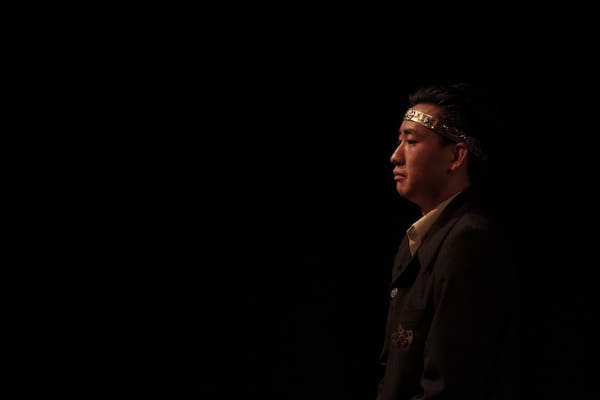The Scottish Play has always held a special place in this reviewer’s heart. I read it as a child (well, the illustrated children’s version of it at least), I enjoyed studying it at school (nerd), and I attended the Sydney Theatre Company’s 2014 rendition, with the titular character played by the legendary Lord Elrond (whom the unenlightened may know as Hugo Weaving). The play is an immense undertaking at the best of times, with some of the most iconic and technically challenging scenes in all of Shakespeare. To pull it off in the midst of a pandemic, and so convincingly, is quite a feat.
This production, directed by Lincoln Gidney, features a sprawling cast of SUDS stalwarts backed up by some newer faces, as well a live band led by Mathew Forbes and Jess Snelleman. While it is beyond the scope of this review to mention them all, many of the supporting actors are the unsung heroes of this play, sweeping on and off stage to deliver perfectly rendered lines in rich Shakespearean, building the larger world around our central characters. Regarding these central characters, Annika Bates does an excellent job of adding a healthy degree of gruffness and grit to the role of Banquo, and Michael Kaufmann shines – albeit briefly – as a boisterous and affable Duncan. Patrick Holman is initially rather reserved as Macduff, but this turns out to be a ploy, as he builds the role to a veritable climax by Acts IV and V. Holman’s reaction to Ross’s (Tom Hanaee) news of the death of Macduff’s family was a truly chilling moment, and one of my favourites in the play.
Regarding the titular couple, Sophia Bryant does a fine job of Lady Macbeth. Bryant particularly shines in the earlier Acts, where she is able to portray the Lady’s manic greed and desperation one moment, and the sincere, respectful host the next. As is fitting, however, Frank Yang’s Macbeth is the performance that really dominates this play. Yang builds the character from humble beginnings in the first Act into an immense exposé in the deterioration of Macbeth’s moral character. By the final Acts, Yang’s Macbeth is a manic, larger-than-life presence that looms over every scene.
These solid performances are backed up by Gidney’s directing. The fight scenes – notably Banquo’s murder and Macduff’s slaying of the tyrant – are well choregraphed and executed, appearing messy and desperate, rather than as flashy sword duels. In addition, Gidney makes the most of a rather limited space by keeping his actors moving. The wings and crossovers of the PACT Theatre’s stage allow characters to flow in and out of the scene, giving the impression of a much larger world than what the audience can physically see. This is particularly effective in the final battle, where bands of Scottish nobles rove back and forth, appearing – thanks to a skilled team of costumers and makeup artists – increasingly scared and haggard as the battle drags on off-stage.
The addition of a live band in this rendition is an interesting and, technically, traditional choice. Macbeth is famed for its frequent use of musical cues, and Forbes and Snelleman do a good job of adding gravitas and emotion to key scenes. Particular standouts were the afore-mentioned battle scene, fight scenes, and Macduff’s revelation of the death of his family. Maggie Laing’s trombone is particularly captivating, as well as Forbes’s own classical guitar. In some places, however, the music lacks polish, and it takes away from some of the soliloquies, which are adequately engrossing in their own right. In other places, the musicians could have been tighter on their cues as well.
The placement of the band at upstage centre, on rising tiers, initially comes across as a bold choice, potentially distracting from the actors. However, the band is linked aesthetically with the set design of Ro Roberts and Paris Paris and the costuming of the witches, helping them to meld with the scene as well as giving the impression that the band and the witches are a singular, primordial presence looming over the events of the play. Indeed, the decision to have the witches (Eve Madden, Sienna Barrientos, Jack Francis West) come and go throughout the play, watching the events unfold with morbid curiosity is an effective touch, and Gidney makes good use out of characters that I had always personally found rather superfluous.
SUDS’ Macbeth was a truly enjoyable experience. While it is perhaps a little rough around the edges at times, this is outshone by an experienced core cast and Yang’s very convincing portrayal of the tyrant. Shakespeare revivals are often a hit or miss, and it takes an experienced cast and director to effectively portray the complexity of the bard’s script. In this reviewer’s opinion, SUDS has definitely delivered.
Macbeth continues its run at PACT this week, and will close on the 22nd of November.





